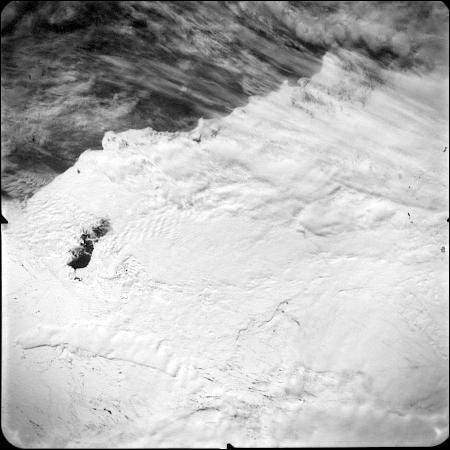This brief essay draws together some thoughts on time blindness and geologic time. I am curious about how to give weight to time, and also how the modeling work I do as a scientist compresses geologic time into human time. It is in the works and will hopefully be revised and redistributed later in life.
Before you read, donate to the Zaynab Project, which provides aid on the ground to families in Deir Al Balah and Khan Younis.
Time blindness is sometimes used to describe one of the symptoms of attention deficit (hyperactivity) disorder (AD(H)D). I was diagnosed with ADD sometime during the pandemic; various medications have helped enormously with my ability to make my way through tasks that require significant mental focus (e.g., reading an academic paper). The (hyper)focus offered by the medication is a double-edged sword, and I find that on it I lose track of time more even as I use that time "better". So the medication contributes to my time blindness, but can reduce my untimeliness.
"Without time, a symphony is a heap of sounds". Marcia Bjornerud proposes timefulness as "a clear-eyed view of our place in Time, both the past that came long before us and the future that will elapse without us". That is, how can the perception of time that geology offers (e.g., that "rock is a verb"), shift our perceptions of time and so, our tendencies on Earth?1
A glacier changes on human and geologic timescales. A glacier records time (change) through the accumulation of material. For a glacier, mass=memory. Layer by layer (season by season), it archives. The relationship between time and space changes over time. Glacial layers, as they are buried deeper in the glacier, compress vertically and stretch horizontally and near the bottom the layers (each representing a unit of time) can twist together.
I conceptualize my time blindness as weightlessness. Time weightlessness is related to (metaphorical) material matter. When I dissociate, my time blindness increases. Without a body, it is much harder to keep track of the days. I sure there is a multi-way relationship between dissociation, long-term memory, and time blindness. How does dissociation contribute to the lack of working memory, and does an inability to form long term memory contribute to the tendency to dissociate? How do you give time weight? Is the only way to give time weight through memory? If dissociation is equivalent to weightlessness or rootlessness, then memory giving weight to time gives a form and matter to my sense of self. This makes me wonder, what would it mean if memories were stored in fat and muscle instead of in our neuronal connections?
I am interested in this sentence in an article that came out in 1997; this work is still regularly cited in current ADHD literature to represent, alternately, working and non-working hypotheses for the diagnosis: "[four executive functions] permit the construction, execution, and control of behavior by internally represented information, which removes behavior from control by the immediate context and brings it under the control of time. ADHD disrupts this process and returns control of behavior to the temporal now. A blindness to past, future, and time more generally…"2
Under the control of time! Control of behavioral to the temporal now! Does time blindness expand or contract time? Does it make time full or time less?
My current scientific research models the surface of the Greenland Ice Sheet. Modeling glaciers compresses and parallelizes time. Modeling glaciers brings geologic time into human time. Does this bring models under the control of behavior in the temporal now? Glaciers, large, slow systems of ice and archive, respond to climate, take time to warm up or cool down, flow, form, grow, melt. They take up time, take in time, and time makes them hard or soft. Glaciers—their bones of crystal and air–are full of time, but less and less and less and less.
Bjornerud, M. and Hagerman, H. (2020) Timefulness: how thinking like a geologist can help save the world. First paperback edition, with discussion questions. Princeton, NJ Oxford: Princeton University Press.
Barkley, R.A. (1997) ‘Attention-Deficit/Hyperactivity Disorder, Self-Regulation, and Time: Toward a More Comprehensive Theory’, Journal of Developmental & Behavioral Pediatrics, 18(4), p. 271.





This was a great read that brings back so many old thoughts, theories and general behaviors. I'd say it gave me chills, but that'd be a bit too much on the nose.
As of yet, I haven't dug into thinking too much about time blindness, but have been considering that it works both ways. To see your break-down, and how you liken it to glaciers. is curious. I re-stacked with a comment, but will re-state that I used to feel a sense of weightlessness and vertigo when I would get too enmeshed/hyperfocused in a task. It's neat to remember that time while considering your comment about weightlessness.
I look forward to picking through your posts and notes, so far they seem to poke my curious centers in my brain. Thanks Elizabeth!
I love this! I love the poetic style of writing and the way you weave the experience of ADHD time blindness -- which I very much relate to - to the time scales of glaciers multiple scales and forms of human memory. As a cognitive scientist with ADHD (and a history as a dance artist) who studies memory and attention, this resonated for me in so many ways. I've been looking around substack trying to find my people, and I think I just found one of them.